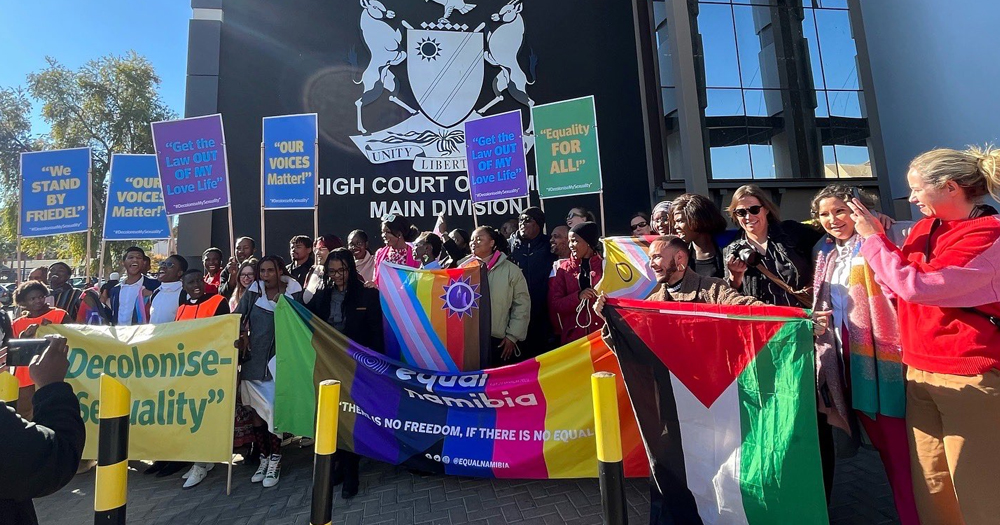In a historic ruling passed on Friday, June 21, the High Court in Namibia overturned a colonial-era ban on same-sex activity in a victory for LGBTQ+ campaigners in the country.
Sexual intercourse between consenting men was criminalised in Namibia under colonial-era laws banning “sodomy” and “unnatural sexual offences”, which the country inherited when it gained independence from South Africa in 1990. While the ban on same-sex activity was rarely enforced, activists said that it perpetuated anti-LGBTQ+ sentiment in Namibia and contributed to discrimination and violence against the community.
In June 2022, LGBTQ+ activist Friedel Laurentius Dausab filed a case against the laws, arguing that they “unfairly and irrationally discriminate against him and other gay men on the basis of sex and sexual orientation and thus infringe his constitution right to equality, dignity, privacy, freedom of expression and freedom of association.”
Dausab was assisted by the Human Dignity Trust (HDT), an organisation that works in jurisdictions around the world to challenge laws where consensual same-sex intimacy is banned. Dausab’s case was heard by the High Court in Namibia in October 2023, while the judgement came last Friday.
The decision of the Namibia High Court to overturn laws related to ‘sodomy’ and decriminalise consensual same sex-sexual conduct, is a victory for love, equality and human rights. pic.twitter.com/bMGhn3Z3yK
— Amnesty International (@amnesty) June 21, 2024
The three High Court judges ruled that the ban on same-sex intimacy amounted to unfair discrimination under Namibia’s constitutional law, given that consensual sexual conduct was not criminalised if it was between a man and a woman.
“What threat does a gay man pose to society, and who must be protected against him?” the decision asked. “We are of the firm view that the enforcement of private moral views of a section of a community (even if they form the majority of that community), which are based to a large extent on nothing more than prejudice, cannot qualify as such a legitimate purpose.”
Dausab welcomed the favourable ruling, saying: “I feel elated. I’m so happy. This really is a landmark judgment, not just for me, but for our democracy.”
He added, “I’m sitting next to my mum and we’re hoping that this message filters through to all families, so that kids are no longer estranged.”
Friedel Dausab, our freedom fighter. Thank you for your dedication to our democracy and for inspiring us to pursue our happiness as born-free queer Namibians. We stand on your shoulders. 🏳️🌈🇳🇦🏳️⚧️ pic.twitter.com/YSa8hocqkd
— Equal Namibia (@EqualNamibia) June 22, 2024
Human Dignity Trust’s Chief Executive, Téa Braun, also commented on the judgement, saying: “I am delighted that Friedel has succeeded in his case against the government of Namibia and proud that our team at the Trust has played a part in his journey to justice.
“Huge credit goes to him, the legal team on the ground and the activist community in Namibia who have supported him. These combined and concerted efforts not only mean that LGBT Namibians can look to a brighter future where their rights to love freely are recognised, but also bring much needed and renewed energy to other decriminalisation efforts across Africa.”
Neighbouring countries South Africa and Angola also decriminalised consensual same-sex activity in 1998 and 2021, respectively.
© 2024 GCN (Gay Community News). All rights reserved.
Support GCN
GCN is a free, vital resource for Ireland’s LGBTQ+ community since 1988.
GCN is a trading name of National LGBT Federation CLG, a registered charity - Charity Number: 20034580.
GCN relies on the generous support of the community and allies to sustain the crucial work that we do. Producing GCN is costly, and, in an industry which has been hugely impacted by rising costs, we need your support to help sustain and grow this vital resource.
Supporting GCN for as little as €1.99 per month will help us continue our work as Ireland’s free, independent LGBTQ+ media.
